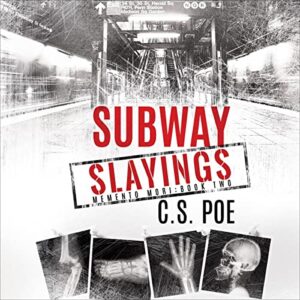Narrated by Kale Williams
C.S. Poe’s Subway Slayings was one of my favourite books of last year, a wonderful combination of clever, tightly-plotted mystery and gorgeous slow-burn romance that gave me a book hangover of the very best kind – and now I get to experience the story all over again with the added benefit of a superlative performance from Kale Williams.
Detective Everett Larkin of the Cold Case Squad has been on medical leave to recover from the broken arm he sustained while apprehending the ‘Death Mask Killer’ at the end of Madison Square Murders. It’s the nineteenth of May and exactly fifty-nine days later (Larkin is nothing if not precise!) and one day before he is due to return to work, he’s called to the Fifty-Seventh Street subway station where a dead body has been found, stuffed in a blue IKEA tote bag, inside a utility closet on the platform. He’s a little confused though, as this is clearly a recent death and is surely a case for Homicide rather than Cold Cases – but the reason becomes clear when the CSU hands him an evidence bag containing a photograph of a teenaged girl slumped on one of the platform benches. The girl is wearing clothes that appear to date from the eighties or nineties and she looks to be asleep – or drunk or stoned – and there’s a message scrawled across the back: “Deliver me to Detective Larkin.”
After making his way out of the tunnels – although not so easily leaving behind the many unpleasant associations prompted by the cramped spaces, the sounds, smells and oppressive heat – Larkin makes his way to the offices of the Forensic Artists department, specifically that of Detective Ira Doyle, to obtain an expert opinion on the photograph. Doyle confirms Larkin’s suspicions about its age, and also notices something else – the girl on the bench isn’t asleep. She’s dead and has clearly been posed. And later that night, Larkin makes an important connection with another cold case, one that has, perhaps, haunted him more than any other – the murder, on exactly the same date twenty-three years earlier, of eighteen-year-old Marco Garcia, who was pushed off the station platform into the path of an oncoming train – at Fifty-Seventh Street station.
There’s no way this can be coincidence. The dates, the location – and the fact that, several weeks earlier, Larkin received a packet containing an old subway token and an anonymous, taunting note – indicate that someone, somewhere is pulling strings, and that somehow, the photo is connected to Marco’s death.
The mystery in Subway Slayings is superbly crafted but disturbing also, as Larkin and Doyle uncover evidence that points to the involvement of a truly despicable network of people who are only to pleased to make money and/or get their kicks off exploiting one of the most vulnerable groups in society.** It’s full of unexpected twists and turns and is meticulously researched, offering some fascinating detail on the art of mourning photography and its place in nineteenth century funereal ritual – an an important link back to Madison Square Murders, in which the killer made death masks in another echo of Victorian mourning tradition.
But while the mystery is compelling, what makes this book – this series – so special is the characterisation of the two leads and the stunning amount of character and relationship development the author packs into her stories. A Traumatic Brain Injury sustained eighteen years earlier has left Larkin with an incredibly rare condition known as Highly Superior Autobiographical Memory (HSAM) which, in his case, means he’s pretty much unable to forget anything that has happened to him since. We’ve learned how it affects every aspect of his life, from his tendency to become hyper-focused and his difficulty with social interaction, to his inability to remember small everyday details; how his parents – and his soon to be ex-husband – see it as an embarrassment; how, to his doctor, he’s a source of fascination and curiosity, and to so many others, he’s ‘lucky’ to have a memory like an elephant! But nobody, in eighteen years, has ever asked him if he’s okay and meant it, nobody has ever wanted to listen. Until now. Until Ira Doyle, the one person who has cared to look past the handsome face, the well-dressed, idiosyncratic and sometimes abrasive exterior and to want an honest answer to the question ‘how are you doing?’
That the two of them are strongly attracted to one another is unquestionable, and their chemistry is off the charts, their emotional connection intense and totally believable. They’ve done no more than kiss so far, but Larkin’s estranged husband assumes they’re having an affair – and he’s right, in a way, but it’s an affair of the heart and mind, not the flesh. Their romance is the sweetest and slowest of slow-burns, and that is absolutely right for who these men are and where they are in their lives. They’ve both suffered a lot of emotional trauma, but Larkin is only just starting to realise just much Doyle uses his innate affability and charm to mask the pain he still feels over his daughter’s death – and inwardly castigates himself for being so blind, that he, a man who takes great pride in his intellect, could have failed to realise just how much of Doyle, even as the man is coming to mean so very much, is still a mystery to him. There’s a beautifully insightful passage in which Larkin realises that Doyle is as much a victim of people not wanting to listen as he has been, that a father’s grief for a young child taken too soon was so painful for them to watch that they just… stopped. And that in the absence of someone to care enough to actually listen, Doyle had walled himself off and become “a mystery”.
That was one of the several times my heart broke a little during this book; another was when Larkin, pushed to his limits – frustrated, angry, scared – has a meltdown. It’s powerful writing and even more powerful as portrayed by Kale Williams, who absolutely nails Larkin’s every conflicting emotion, every fear, every insecurity and vulnerability in a single minute (or so) of audio. It’s painful to listen to, yet clearly a cleansing moment for Larkin who, in Doyle, has finally found someone able and willing to listen and understand. He hopes he can be that for Doyle, too.
But for all the darkness of the mystery and the insightful explorations of grief and loss, the book isn’t without its lighter moments. Doyle’s gentle flirtatiousness and humour, Larkin’s deadpan snark and their good-natured banter are much in evidence, and the moments of tender intimacy, are simply beautiful.
Kale Williams is on top form here, delivering a well-paced and superbly characterised performance that expertly captures the personalities of the two leads, rounds out the secondary cast and provides an excellent counterpoint to the action. I said, in my review of Madison Square Murders, just how perfectly cast he is as Doyle because his voice is exactly the right kind of smoky-smooth the author describes; the warmth and humour that embody the character come through strongly whenever Doyle speaks, but now, as he’s letting his guard down around Larkin – just a little – those difficult, hard emotions he works so hard to hide are starting to sneak through more often. They’re a little muted, because Doyle clearly isn’t ready to let himself be totally known yet, but the sense of him as someone who is, at times, as much on the edge as Larkin comes through in the slight brittleness in some of his dialogue and way of pausing as though reining himself in. His portrayal of Larkin is incredibly impressive; I often talk about narrators who act and are expressive, but because Larkin’s TBI affected his speech and he literally can’t emote, Mr. Williams has to convey a wide range of emotion without using a lot of inflection, even in moments of great stress, and he does an amazing job of it, making it clear that Larkin feels a very great deal even though he is unable to vocalise those emotions in a way most people can recognise and relate to.
It’s an outstanding performance of an outstanding novel; the author’s thank you in the dedication at the beginning to “Kale… for elevating this series to something more” is more than well deserved, but I think she should get to take some of the credit for the exceptional insight and intelligence of her writing, too ;) Subway Slayings is a real treat of a listen, and one you won’t forget in a hurry. Highly recommended.
** Note: there is nothing graphic on the page, but crimes against children and young people are central to the plot.
Caz
Buy Subway Slayings by C.S. Poe on Amazon





I loved this book when I read it and am really looking forward to listening to the audio. I’m currently saving it until I can give it the attention it deserves!
I get that – I hope you can find time to shut out the world and enjoy it soon!
Such a great book and audiobook! Your review made me wish I could experience it again for the first time. I can’t wait for the next one.
I like the article you write. Great history lesson and I can really appreciate all the research you do. Really amazing article. I got many crucial ideas from it. Thanks for sharing this article.